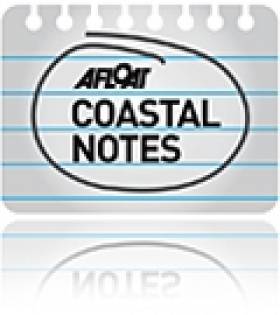Displaying items by tag: Irish Sea operations
RFA ‘Atlantic Patrol Tasking North’ Replenishment at Sea Tanker Offshore of Greystones
#UKNavalTanker - RFA Wave Knight (A389) a 31,500dwt tanker which supplies the Royal Navy was some 20 nautical miles offshore of Greystones Harbour during a mid-week northbound passage in the Irish Sea, writes Jehan Ashmore.
The 10,000nm range Royal Fleet Auxiliary (RFA) vessel with a crew of 72, is the leadship of the 'Wave Knight' class of Fast Fleet Tankers that had departed Plymouth.
The vessel has not called to any Irish Port but is currently deployed on operation 'Atlantic Patrol Tasking North'.
She is also used to serve global operations, where the RFA Wave Knight provides fuel, food, fresh water, ammunition and other supplies in addition to support amphibious forces, anti-surface and anti-submarine warfare operations.
To carry out refuelling, RAS (Replenishment at sea) this is carried out through a hose-pipe rig, to a vessel either to port or starboard and also can be conducted astern.
Another role of the 196m vessel is to carry out helicopter missions on humanitarian relief events and also weapons systems operations. This requires 26 Royal Navy personnel for helicopter operations, noting the stern-landing deck and hanger as pictured HERE of the vessel.
Launched in 2000 at VSEL, Barrow-On-Furness, the Cumbrian port on the Irish Sea switched ownership during Wave Knight's fit-out. So by the time the 16,900 tonnes fuel capacity tanker was accepted into RFA service in 2003 this was then during control of BAE Systems Marine.
She is the second ship to bear this name in RFA service and her sister RFA Wave Ruler (A390) was also named after a previous oiler replenishment tanker. As previously reported, RFA Gold Rover (A271) another RAS tanker made a visit to Dublin Port last year.
Also reported was this week's visit of the French Navy's BCR Somme (A 631) to Dublin Port. The auxiliary oil replenishment tanker (AOR) again another term for this type of naval support vessel is seen carrying out a RAS operation as captured by clicking this VIDEO link.
It was during the four-day visit that the French Ambassador to Ireland presented the Legion d'Honneur to Michael 'Mickey' d'Alton's contribution to the success of D-Day in 1944.
For much more about one of the last Irish survivors of this critical event during WW2, Afloat's W. M. Nixon reflects on some very special stories of this senior Dun Laoghaire sailor.
Following the ceremony, the Somme departed Dublin Port last Tuesday morning.
The Brest-based ship which is home-ported in the Breton naval base to carry out her area of operations in the Atlantic, was instead understood to be bound for another base in Toulon on the Mediterranean.
























































